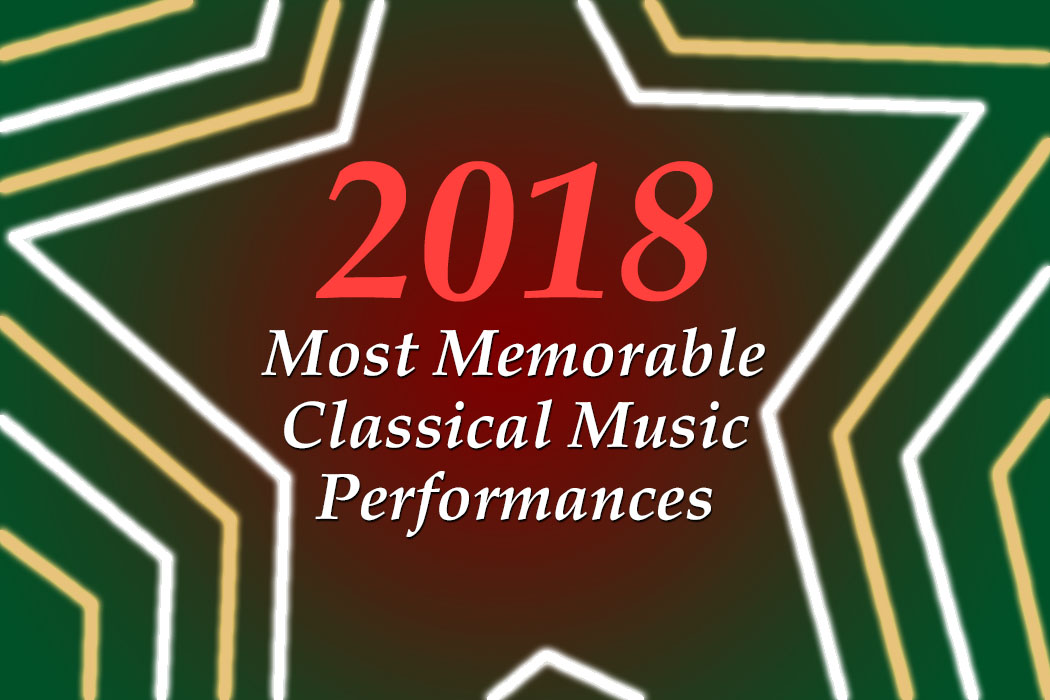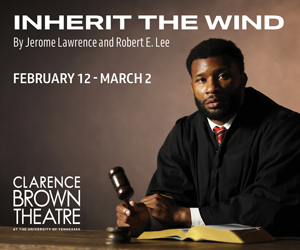Although every music season differs in the performers involved and their artistic choices, each year has its unmistakable trends and distinctive personalities. Themes emerge, certain composers or music become trendy for one reason or another, and current events often place dramatic issues in the spotlight. So, what are we to make of Knoxville’s 2018 classical music season?
In November, the Knoxville Symphony Orchestra announced a three-year contract extension had been given to music director Aram Demirjian, making official his involvement through the 2021-22 season. Audiences have reacted positively to Demirjian’s energy and personality, giving him ground on which to make some compelling programming choices, satisfying traditional listeners as well as those who are a bit more musically adventurous.
Knoxville Opera spent its winter and spring on two larger scale productions at the Civic Auditorium, Turandot and Aida, but returned to its usual venue of the Tennessee Theatre in the fall for a double bill of The Impresario and Gianni Schicchi. Marble City Opera has doubled down on its role as Knoxville’s chamber opera company by making some bold selections of its own: Postcard from Morocco and Nero Monologues. The UT Symphony Orchestra under James Fellenbaum continues to surprise and delight audiences with quantum leaps in performance ability, qualities they need as they embark on the two-year Beethoven250 celebration.
Perhaps the most dynamic changes in Knoxville’s 2018 music season came in choral music. Replacing the retiring Dr. Eric Thorson, Dr. John Orr has assumed the music directorship of the Knoxville Choral Society and its subset ensemble, the Knoxville Chamber Chorale. Filling a different niche in choral music was Symphony of Voices, a 12 member choral ensemble consisting of local music professionals, who now have two notable concerts under their belts. Also springing up on the choral music scene was the Knoxville Handel Society.
The threshold for what is “memorable” certainly went up this year, making some choices incredibly difficult. Nevertheless, here is the list of Most Memorable Classical Music Performances for 2018.
Most Memorable Orchestral Performances
Two performances by the Knoxville Symphony Orchestra seemed to sneak in above some others. In January, a performance of Dvorak’s Symphony No. 8 in G Major earned the distinction thanks to an “ebullient clarity” emanating from Maestro Aram Demirjian’s broad brush strokes of tempo and texture—and from an abundance of notable playing from the woodwind principals: Hannah Hammel, flute; Claire Chenette, oboe; Gary Sperl, clarinet; and Aaron Apaza, bassoon.
A performance of Shostakovich’s Symphony No. 5 on October’s Masterworks concert took me by surprise, forcing me to admit that it was “one of the most compelling and accomplished of the year so far… a mix of emotional insistence and unsentimental brashness.” “Concertmaster William Shaub gave the movement’s violin solo passages a poignant point of view.”
A significant nod must also go to the KSO and guest conductor Eric Jacobsen for a vibrant November concert that included Schumann’s Symphony No. 3 and Mendelssohn’s Overture to A Midsummer Night’s Dream.
Most Memorable Concerto Performances

Sometimes energy feeds on energy and inspiring performances inspire others. The same October Masterworks concert that offered the Shostakovich symphony mentioned above, also featured violinist Robyn Bollinger in a performance of Tchaikovsky’s Violin Concerto. “The young violinist kept her interpretation fresh—and the audience enthralled— through passagework that brimmed with clean details and a delightful rhythmic and melodic take, all the while displaying razor-sharp technique.”

Concertmaster Shaub and Principal Second Violin Edward Pulgar had the spotlight in a February Chamber Orchestra performance, and on loaned Stradivarius violins—“The performance of concertmaster William Shaub and principal second violin Edward Pulgar as soloists in the Bach Double Concerto was bold and assertive, yet beautifully and strategically balanced—with a sound that radiated both a silken clarity and warmth. The ensemble balance and string presence perfectly complemented the soloists.”

Pianist Fei-Fei Dong joined guest conductor Edwin Outwater in the April Masterworks concert for Mozart’s Piano Concerto No. 20. From my review: “This was a beautifully wrought performance, full of nuance and sweet, chalky tones, supported by splendidly assured passagework. In the second Romance movement—a movement that ranks with the most lyrically subtle and charming ever written—Dong became one with that ineffable quality that is Mozart’s simple complexity.”
Most Memorable Chamber Music Performances
Technically, I suppose, November’s Concertmaster Series performance of “Fall” and “Winter” from Vivaldi’s The Four Seasons belongs in the concerto category, but I’ll put it here due to its ensemble size and the venue, the Knoxville Museum of Art. “In the chamber music context, William Shaub’s performance was full of Baroque passion, vitality, and energy, exquisitely rendered with refined details that escape one in recordings. The delicious dissonant perversity of “Winter” was worth the price of admission alone.” Ensemble members: Sean Claire, Gordon Tsai, Edward Pulgar, and I-Pei Lin, violins; Kathryn Gawne, viola; Andy Bryenton, cello; Steve Benne, bass; and Emi Kagawa, electronic harpsichord.

In September, UT faculty violinist Miroslav Hristov was joined by four guest performers for a notable chamber music evening that included Schubert’s String Quintet in C Major (the “Cello Quintet”). “In the acoustic quietness of the Powell Recital Hall, the quintet achieved that ineffable quality of musical introspection that momentarily pulls the listener away from the real world. This was particularly the case in the Adagio, full of cries and whispers, where performers must tiptoe just on the edge of despair without tumbling in.” Ensemble members: Hristov and Yu-Fang Chen, violins; David Kováč, viola; Sean Hawthorne and Daniel Veis, cellos.
And significant nods go to:
• January’s Chamber Classic performance of Beethoven’s Septet in E-flat Major, Op. 20 featuring members of the KSO Principal Quartet and Woodwind Quintet. (Gary Sperl, clarinet; Aaron Apaza, bassoon, Jeffery Whaley, horn; Gordon Tsai, violin; Kathryn Gawne, viola; Andy Bryenton, cello; Steve Benne, bass.
[Correction: A previous version of this article incorrectly identified the septet members and the instrument complement.]
• November’s Q-Series performance by the KSO Woodwind Quintet of David Maslanka’s intriguing Quintet for Winds No.3.
Most Memorable Choral Music Performances
As mentioned in the introduction, Knoxville choral music is in something of a transition as new ensembles appear and older ones look for new challenges and turn in excellent performances.

A regular partner with the KSO, the Knoxville Chamber Chorale joined the orchestra and resident conductor James Fellenbaum for its “Classical Christmas” concert in November. I was enchanted by a number of the Chorale’s selections, “…but [John Rutter’s] Three Kings of Orient featuring the orchestra and the Chamber Chorale turned out to be one of the big highlights of the afternoon…the Chorale did two fine pieces by contemporary American composers, Matthew Culloton (“Infant Holy, Infant Lowly”) and Connor Koppin (“There is No Rose”), great material for this accomplished choral ensemble.”

The creation of new ensembles is an essential process for any music scene that hopes to grow as its city grows. New—and notable—to the Knoxville choral music scene is Symphony of Voices, a 12-member self-directed professional ensemble that made its debut in a September concert, following it up with a concert of Holiday music in December. On that latter concert, they intrigued this listener with “Stars by Ēriks Ešenvalds … written for the usual four part choir, but with the addition of tuned water glasses played by the ensemble. The vocal lines ebb and flow with rich harmonies and textures, with the water glass pitches creating an ethereal dissonance that was sonically intoxicating.”
Most Memorable Opera Performances
I am forced to add operetta to this category, for the collaboration of the KSO and Clarence Brown Theatre in a production of Leonard Bernstein’s Candide practically defined the word “memorable.” The production, directed by CBT’s Calvin MacLean with musical direction by the KSO’s Aram Demirjian, featured the orchestra onstage with the action. [Read the Arts Knoxville review here]
In terms of individual operatic performances, two singers in featured roles captured the audience’s attention this year.
—In Knoxville Opera’s Turandot, “Soprano Yunnie Park, in the role of Liù, was stunningly effective in contrasting the character’s simplicity with a naive, but courageous resolve, giving that transition a credibility. And, Park gave Liù’s final aria “Tanto amore segreto” a gorgeous heartbreaking charm, backed with subtle strength, that earned her a substantial ovation at curtain call.

—And, in Knoxville Opera’s Aida, “A familiar face and voice for Knoxville Opera audiences, baritone Scott Bearden [Amonasro] is not only a superb and versatile operatic actor, but his compelling vocal power, coupled with an uncanny beauty of tone, clarity of diction, and ability to project, clearly elevated the character to a dominant position in this Aida.”
Most Memorable Contemporary Music Performances
In an ideal world, music performances would never be pigeon-holed into traditional and contemporary categories. And, if Ashley Capps and the Big Ears Festival get their way, that will become the case with connections between performers creating new experiences. Although outside of the gravity of big-city performances, the festival enchants everyone who falls into its own gravity. “If Big Ears were a series of concentric circles,” wrote Ben Ratliff in the New York Times, “Music informed by the classical tradition would sit at the center, its lessons and suggestions radiating outward. Each year the festival spotlights a composer whose work is presented by many different ensembles and in different situations…”
Knoxville-based Nief-Norf is the creation of UT percussion faculty member Andy Bliss and a fellow Illinois native Kerry O’Brien. The organization’s presence in Knoxville, and its continued contributions to Big Ears, as well as its own Summer Festival in June, seem to be making the City a focal point, of sorts, for contemporary music. At least, we can hope.






